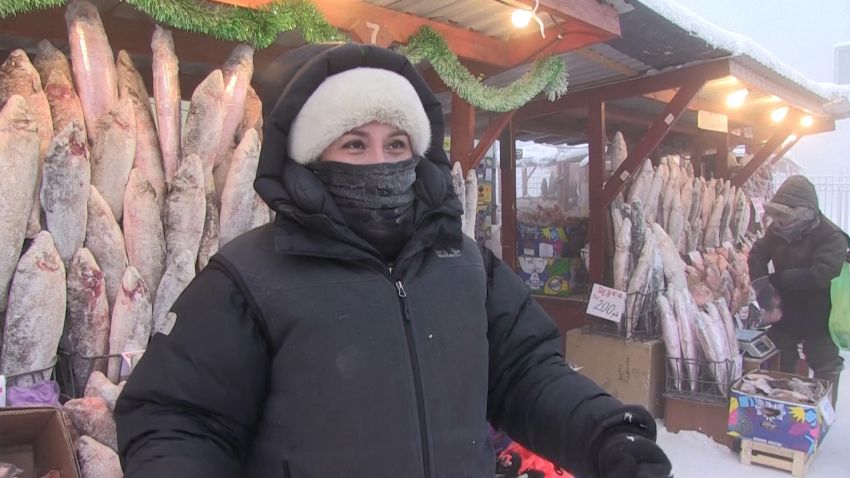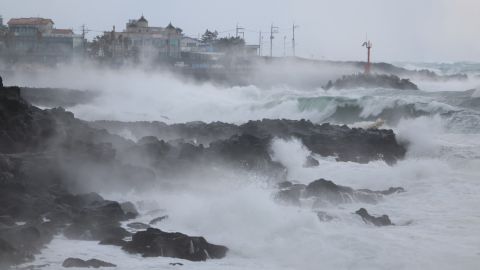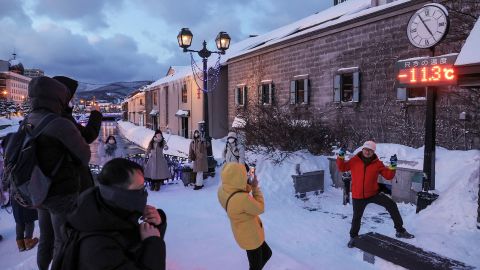Hong Kong
CNN
–
A deadly cold snap sweeping across East Asia has killed at least four people in Japan after sub-zero temperatures and heavy snow wreak havoc on travel over the Lunar New Year holiday, with climate experts warning such extreme weather events are becoming ” The new rule.
Japanese officials said all those who died on Wednesday and Thursday were working to clear snow amid what Chief Cabinet Secretary Hirokazu Matsuno described as a “once-in-a-decade” cold snap.
Two deaths were reported in western Niigata Prefecture, one in southwestern Oita Prefecture and one in southern Okayama Prefecture – where the victim suffered a heart attack.
In neighboring South Korea, heavy snowfall warnings were issued this week as temperatures in the capital, Seoul, dropped to minus 15 degrees (5 degrees Fahrenheit) and fell to record levels in other cities, officials said. Residents said that it started to snow heavily from Wednesday night into Thursday.
On the popular tourist island of Jeju, severe weather this week led to hundreds of flights being canceled while passenger ships were forced to stay in port due to heavy seas, according to the Central Disaster Mitigation and Safety Headquarters.
“The cold air from the North Pole reached South Korea directly,” Woo Jin-kyu, a spokesman for the Korea Meteorological Administration, told CNN after traveling through Russia and China.

See what life is like inside one of the coldest places in the world
Wu said that while scientists have taken a long-term view of climate change, “we can consider these extreme weather — very hot summers and very cold winters — as one of the signs of climate change.”
Across the border in Pyongyang, North Korean authorities warned of severe weather as a cold snap swept across the Korean peninsula. Temperatures in parts of North Korea are expected to drop below minus 30 degrees Celsius (minus 22 degrees Fahrenheit), state media reported.
in Japan, Hundreds of domestic flights were canceled on Tuesday and Wednesday due to heavy snow and high winds that hampered visibility. Major airlines Japan Airlines and All Nippon Airways canceled a total of 229 flights.

Meanwhile, the Japan Railways Group said high-speed trains between Fukushima and Shinju stations in the north have been suspended.
China’s meteorological agency also forecast significant temperature drops in parts of the country, and on Monday issued a blue alert for a cold snap – the lowest level in a four-tier alert system.
mohiIn far north China, temperatures on Sunday fell to minus 53 degrees Celsius (minus 63.4 degrees Fahrenheit), the coldest on record, meteorologists said. ice fog Local authorities said the weather phenomenon – which only occurs in extreme cold when water droplets remain in the air in liquid form – is also expected in the city this week.
Other parts of Asia have also felt the effects of the harsh cold weather.
Earlier this month in Russian Siberia, temperatures were in a city Yakutsk It stood at -62.7 °C (-80.9 °F) – a record for a place widely known as The coldest city in the world.
They also felt cold Afghanistanaccording to Taliban officials Death cases At least 157 people die as the country experiences one of its coldest winters on record with minimal humanitarian assistance. Officials said temperatures in early January dropped to minus 28 degrees Celsius (minus 18 Fahrenheit).

Yeh Sang-wook, a climate professor at Hanyang University in Seoul, attributed the severe cold snap on the Korean Peninsula to Arctic winds from Siberia, adding that the cold snap in South Korea this year is partly due to the melting of the Arctic ice caps. warm climate.
“There was a record melt last year and this year,” he said. “When the sea ice melts, the sea opens up, which puts more vapor in the air, which leads to more snow in the north.”
He said that as climate change worsens, the region will face very cold weather in the future.
He said, “There is no other (interpretation).” “Climate change is already deepening and there is a consensus among the world’s scientists that this type of cold phenomenon is only going to get worse in the future.”
“Extreme weather events are the new norm,” agreed Kevin Trenberth, of the US National Center for Atmospheric Research (NCAR), adding, “We can certainly expect extreme weather events to be worse than they have been before.”
He also noted the cycles of El Niño and La Niña climate patterns in the Pacific Ocean that affect weather around the world.
La NiñaWhich usually has a cooling effect on global temperatures, is one of the reasons for the current cold snap.
“There’s definitely a lot of natural variance that happens in the weather but…we hear a lot about El Niño and right now we’re in a La Niña phase. That certainly affects the kinds of patterns that tend to happen. And that’s a player as well.”

“Lifelong food lover. Avid beeraholic. Zombie fanatic. Passionate travel practitioner.”
